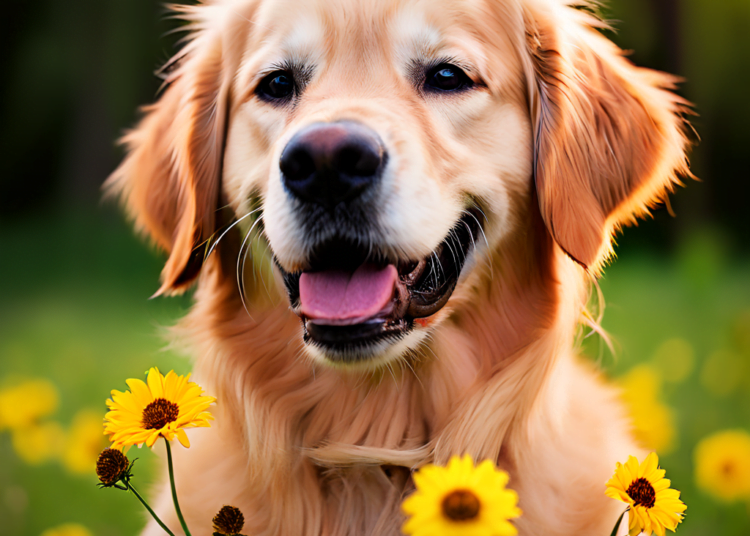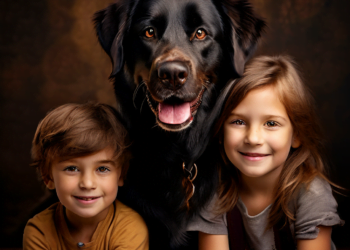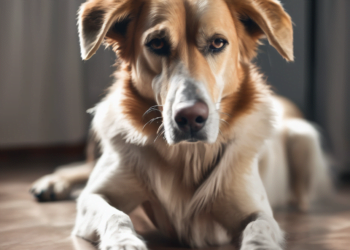If you’re a Golden Retriever owner or thinking about adopting one, we’ve got you covered with our comprehensive guide on how to care for this beloved breed. In this article, you will find essential tips on how to keep your furry friend healthy, including insights on their health and grooming needs, to ensure that your Golden Retriever is happy and thriving.
Golden Retrievers are known for their friendly and gentle nature, making them perfect family pets. However, like any other breed, they have specific needs that require attention and care. By following our expert advice, you can provide your Golden Retriever with the best possible care.
Key Takeaways:
- Regular grooming, including brushing their beautiful coats to prevent matting and bathing them regularly, is essential for Golden Retrievers.
- Golden Retrievers thrive on love and attention, so ensure you spend quality time with them daily.
- Proper nutrition is vital for their overall health and well-being, so feed them high-quality dog food specifically formulated for their size and activity level.
- Training and socialization are crucial to raising a well-behaved and well-adjusted Golden Retriever.
- Regular exercise and mental stimulation are important to keep them physically fit and mentally satisfied. Taking them for daily walks and engaging them in interactive games will help fulfill their needs.
All About Golden Retrievers
As one of the most popular dog breeds, Golden Retrievers have captured the hearts of millions with their charming personality traits and lovable nature. Whether you’re considering getting a Golden Retriever or already have one as your furry companion, it’s essential to have a deeper understanding of this breed and what sets it apart.
Temperament
The golden retriever is known for its friendly and outgoing temperament, making it an excellent family pet. It is affectionate, loyal, and eager to please, making it a joy to have around children and other pets. Its gentle nature often extends to strangers, making it a poor candidate for guarding homes but exceptional at providing comfort and companionship.
Intelligence
Golden Retrievers are highly intelligent dogs that are quick to learn and eager to please their owners. This intelligence and their love for human interaction make them highly trainable dogs. From basic commands to advanced skills, they excel in obedience training and various dog sports.
Golden Retrievers are not only intelligent but also highly adaptable, making them suitable for a variety of lifestyles and living situations. Whether you have an active outdoor lifestyle or prefer a more relaxed atmosphere, this versatile breed can adapt to your preferences.
Compatibility
Golden Retrievers are known for their excellent compatibility with families and individuals of all ages. They are patient and gentle with children, making them fantastic playmates and guardians. Additionally, their friendly nature allows them to get along well with other pets, making multi-pet households a good fit for this breed.
If you’re looking for a companion that brings joy, love, and loyalty into your life, the Golden Retriever is an ideal choice. With their remarkable temperament, intelligence, and compatibility, they make wonderful additions to any family.
Training Tips for Golden Retrievers
Training your Golden Retriever is essential for promoting good behavior and creating a strong bond with your furry friend. Here are some effective training tips specifically tailored for Golden Retrievers:
- Start early: Begin training your Golden Retriever when you bring them home. Puppies are like sponges and can learn quickly.
- Use positive reinforcement: Reward your Golden Retriever with treats, praise, and petting when they exhibit desired behaviors. This positive reinforcement will motivate them to repeat those behaviors.
- Be consistent: Use consistent commands and cues during training sessions. This helps your Golden Retriever understand what is expected of them.
- Start with basic commands: Teach your Golden Retriever essential commands such as sit, stay, come, and lie down. These commands form the foundation for further training.
- Be patient and persistent: Training takes time and effort, so be patient with your Golden Retriever and stay consistent and persistent in your training methods.
- Socialize your Golden Retriever: Introduce your Golden Retriever to different people, animals, and environments to ensure they are well-socialized. This will help prevent behavioral issues in the future.
- Seek professional help if needed: If you’re struggling with training or behavioral issues, consider working with a professional dog trainer specializing in Golden Retrievers.
Remember, training your Golden Retriever is an ongoing process. Regular training sessions and positive reinforcement will help your Golden Retriever grow into a well-behaved and happy pet.
“Training your Golden Retriever is not just about obedience. It’s about building trust, strengthening your bond, and creating a harmonious relationship.” – Karen Pryor
| Training Tips for Golden Retrievers | Description |
|---|---|
| Start early | Begin training your Golden Retriever as soon as you bring them home. Puppies are quick learners. |
| Use positive reinforcement | Reward your Golden Retriever with treats, praise, and petting to motivate and reinforce desired behaviors. |
| Be consistent | Use consistent commands and cues to help your Golden Retriever understand what is expected of them. |
| Be patient and persistent. | Teach essential commands like sit, stay, come, and lie down to establish a foundation for further training. |
| If you’re struggling, consider working with a professional dog trainer specializing in Golden Retrievers. | Training takes time and effort, so be patient with your Golden Retriever and stay consistent. |
| Socialize your Golden Retriever | Expose your Golden Retriever to different people, animals, and environments for proper socialization. |
| Seek professional help if needed | If you’re struggling, consider working with a professional dog trainer who specializes in Golden Retrievers. |
Caring for Golden Retrievers
Providing the best care for your Golden Retriever is essential to ensure their overall well-being and happiness. From nutrition and exercise to veterinary care and vaccinations, there are several key aspects to consider when caring for your beloved pet.
Nutrition
Providing a balanced and nutritious diet is an important part of caring for your Golden Retriever. Choose high-quality dog food specifically formulated for their age, size, and activity level. Consult with your veterinarian to determine the right portion sizes and feeding schedule for your furry friend.
Exercise
Golden Retrievers are active and energetic dogs that require regular exercise to stay healthy and happy. In a secure and spacious area, engage them in daily physical activities such as walks, runs, or playtime. Mental stimulation is also essential, so incorporate puzzle toys or obedience training into their exercise routine.
Veterinary Care
Regular visits to the veterinarian are crucial for maintaining your Golden Retriever’s health. Schedule annual check-ups, vaccinations, and preventive treatments for common issues like fleas, ticks, and heartworms. Keep a record of their vaccinations and medications to ensure they receive the proper care.
Grooming
Golden Retrievers have thick, water-repellent coats that require regular grooming to keep them clean and tangles-free. Brush their fur at least once a week to prevent matting and to remove loose hair. Bathing should be done only when necessary to avoid stripping their coat of natural oils. Don’t forget to regularly check and clean their ears, trim their nails, and brush their teeth to maintain their overall hygiene.
Love and Attention
A vital part of caring for your Golden Retriever is giving them plenty of love, attention, and social interaction. These dogs thrive on human companionship and enjoy being part of the family. Make sure to spend quality time with them, offer praise and rewards for good behavior, and provide them with a comfortable space to feel safe and secure.
Golden Retriever Health Issues
Golden Retrievers are known for their friendly and exuberant nature, but like any other breed, they can be prone to certain health issues. Owners must know these potential problems to provide the best care for their furry friends.
Common Health Issues
- Hip Dysplasia: This genetic condition affects the hip joint, causing pain and mobility issues.
- Elbow Dysplasia is similar to hip dysplasia but affects the elbow joint. It can lead to lameness and discomfort.
- Cancer: Golden Retrievers have a higher risk of developing cancer, especially lymphoma and hemangiosarcoma.
- Heart Disease: Certain heart conditions, such as cardiomyopathy, can affect Golden Retrievers.
- Allergies: These can manifest as skin allergies, food allergies, or respiratory allergies.
- Epilepsy: Some Golden Retrievers may develop epilepsy, resulting in seizures.
- Eye Disorders: Progressive retinal atrophy (PRA) and cataracts are common eye issues in the breed.
Recognizing Symptoms
Knowing how to recognize your Golden Retriever’s early signs of health issues can help you seek prompt veterinary care. Keep an eye out for:
- Limping or difficulty in movement
- Loss of appetite or weight loss
- Lethargy and lack of energy
- Changes in behavior or personality
- Excessive itching or skin irritation
- Seizures or tremors
- Eye redness or cloudiness
If you notice any of these symptoms or have concerns about your Golden Retriever’s health, it’s crucial to consult a veterinarian for a proper diagnosis and treatment.
Prevention and Care
While not all health issues can be prevented, there are steps you can take to minimize potential risks and promote your Golden Retriever’s well-being:
- Regular veterinary check-ups and vaccinations
- Providing a balanced diet and maintaining a healthy weight
- Keeping your Golden Retriever physically active and mentally stimulated
- Implementing preventive measures for allergies, such as hypoallergenic diets and regular grooming
- Early socialization and training to prevent behavioral issues
| Health Issue | Symptoms | Prevention |
|---|---|---|
| Hip Dysplasia | Limping, difficulty in movement | Exercise moderation, orthopedic screening |
| Cancer | Weight loss, lumps or bumps | Regular vet check-ups, early detection |
| Heart Disease | Coughing, fatigue | Healthy diet, regular vet check-ups |
| Eye Disorders | Cloudy or red eyes, vision changes | Regular eye exams, genetic testing |
By staying informed about common health issues, recognizing symptoms early on, and providing proper preventive care, you can help ensure your Golden Retriever leads a happy and healthy life.
Grooming Guide for Golden Retrievers
Proper grooming is essential for maintaining the health and appearance of your beloved Golden Retriever. By understanding their unique grooming needs and implementing a regular grooming routine, you can ensure that their coat remains clean, shiny, and healthy.
Brushing
Regular brushing is a crucial part of the grooming process for Golden Retrievers. Their thick, double coat requires frequent brushing to prevent matting and remove loose fur. Use a slicker brush or a de-shedding tool to gently brush through their coat, paying extra attention to areas prone to matting, such as the ears, underbelly, and tail. This not only helps to keep their coat in optimum condition but also promotes good blood circulation.
Bathing
When it comes to bathing your Golden Retriever, moderation is key. While they may enjoy water activities, excessive bathing can strip their coat of natural oils and cause skin irritation. Aim to bathe them every 6-8 weeks or as needed, using a gentle dog shampoo specifically formulated for their sensitive skin. Remember to thoroughly rinse all the shampoo to avoid any residue that could lead to skin problems.
Nail Care
Regular nail trimming is important for your Golden Retriever’s comfort and well-being. Long nails can cause discomfort and potentially lead to paw injuries. Use a quality dog nail clipper or a grinder to trim their nails, being careful not to cut too close to the quick. If you are unsure, consult a professional groomer or veterinarian for guidance.
Ear Cleaning
Golden Retrievers have floppy ears that can trap moisture and debris, making them prone to ear infections. To prevent such issues, make it a habit to clean their ears regularly. Use a dog-specific ear-cleaning solution and gently wipe the outer ear with a cotton ball or a damp cloth. Avoid inserting anything into their ear canal to prevent injury.
Professional Grooming
While regular home grooming is essential, scheduling regular visits to a professional groomer for a thorough cleaning and maintenance of your Golden Retriever’s coat is also beneficial. Professional groomers have the expertise and proper tools to ensure your furry friend receives the best care and attention.
A well-groomed Golden Retriever not only looks great but also feels great. Following this grooming guide, you can keep your Golden Retriever’s coat healthy and their overall well-being in optimal condition.
The Golden Retriever as a Popular Family Pet
Golden Retrievers are widely recognized as one of the most popular family pets, and for good reason. Their gentle nature, adaptability, and ability to bond with family members of all ages make them an excellent choice for households seeking a loving and loyal companion.
One of the key qualities that sets Golden Retrievers apart is their gentle and friendly disposition. These dogs are known for their patience and tolerance, making them ideal companions for families with young children. Their calm and patient nature allows them to handle the enthusiasm and energy of kids, making them a beloved member of the family.
Golden Retrievers are also highly adaptable dogs. Whether you live in a small apartment or a spacious house, these versatile canines can easily fit into various living environments. Their adaptability enables them to thrive in urban settings or suburban neighborhoods, provided they receive the necessary exercise and mental stimulation.
Additionally, Golden Retrievers possess a remarkable ability to bond with their human family members. They thrive on companionship and seek to be an integral part of family activities. Golden Retrievers are known to be highly friendly and loving, forging strong bonds with each family member. Their loyalty and devotion make them the perfect addition to any household.
Whether playing fetch in the backyard or snuggling on the couch, Golden Retrievers are always up for quality time with their loved ones. Their affectionate nature and eagerness to please make them excellent family pets that bring joy and warmth to any home.
Creating a Safe Environment for Your Golden Retriever
Creating a safe environment is paramount when providing the best care for your beloved Golden Retriever. By taking essential steps to pet-proof your home and identifying potential hazards, you can ensure a secure and comfortable space for your furry companion.
1. Secure your home
Golden Retrievers are curious and active dogs, so securing your home is crucial to prevent accidents or escapes. Start by checking fences, gates, and doors to ensure they are properly closed and in good condition. If your Golden Retriever spends time in the yard, consider installing a secure fence to prevent them from wandering off.
2. Remove potential hazards
Golden Retrievers love to explore their surroundings, so removing any potential hazards from their reach is essential. This includes toxic plants, cleaning products, chemicals, electrical cords, and small objects that can be easily swallowed. Keep these items in secure cabinets or out of your pet’s reach.
3. Create a designated space
It’s important to provide your Golden Retriever with a comfortable and secure space they can call their own. This can be a crate, a bed, or a designated area in your home where they can retreat when they need some downtime. Ensure this space is quiet, cozy, and free from potential dangers.
4. Keep an eye on outdoor activities
When allowing your Golden Retriever to enjoy outdoor activities, such as park walks or beach trips, always keep a close eye on them. Be aware of potential hazards, such as toxic plants, sharp objects, or aggressive animals, and intervene to ensure their safety.
5. Regularly inspect your home
To maintain a safe environment, it’s important to regularly inspect your home for any potential hazards or wear and tear. This includes checking for loose wires, damaged furniture, and other objects that could risk your Golden Retriever’s well-being.
“Creating a safe environment for your Golden Retriever not only protects them from potential dangers but also provides them with a sense of security and comfort, allowing them to thrive in their surroundings.”
Here’s an example of a secure and comfortable space for your Golden Retriever:
| Items | Description |
|---|---|
| Comfortable Bed | A soft and cozy bed for your Golden Retriever to relax on. |
| Water Bowl | A clean and easily accessible water bowl to keep your pet hydrated. |
| Toys | Interactive toys to keep your Golden Retriever mentally stimulated. |
| Chew Treats | Durable chew treats to satisfy your dog’s natural urge to chew. |
| Blanket or Pillow | A cozy blanket or pillow for extra comfort. |
By following these essential steps and providing a safe environment for your Golden Retriever, you can ensure their well-being and create a harmonious living space for you and your furry companion.
Socializing Your Golden Retriever
Socializing is key to raising a happy and well-adjusted Golden Retriever. Golden Retrievers are known for their friendly and pleasant nature. Still, proper socialization from an early age is crucial to ensure they develop positive behaviors and interactions with people, animals, and different environments.
By exposing your Golden Retriever puppy to various experiences, you can help them build confidence and adaptability. This will make them more comfortable in new situations and reduce the likelihood of future behavioral issues.
Why Is Socialization Important?
Socialization plays a vital role in shaping your Golden Retriever’s behavior and temperament. It helps them become comfortable and well-behaved around strangers, children, pets, and environments. Socialized Golden Retrievers are likelier to exhibit calm and friendly behavior in various situations, making them enjoyable companions for outings, visits, and daily life.
Proper socialization is particularly important for Golden Retrievers due to their friendly disposition. Not socializing them adequately may result in shyness, fearfulness, aggression, or other behavioral issues. By introducing them to various stimuli during their critical socialization period, which occurs between 3 and 14 weeks of age, you can positively shape their behavior and ensure they grow into well-rounded adult dogs.
Tips for Socializing Your Golden Retriever
1. Introduce to different people: Expose your Golden Retriever puppy to people of all ages, sizes, and backgrounds, including children, adults, and the elderly. Encourage positive interactions by rewarding calm and friendly behavior.
2. Take them to new places: Gradually introduce your puppy to different environments, such as parks, busy streets, outdoor cafes, and pet-friendly stores. This exposure will help them become more confident and adaptable in unfamiliar settings.
3. Expose them to other animals: Arrange controlled meetings with well-behaved dogs, cats, and other animals to teach appropriate social behavior. Observe their interactions closely and intervene if necessary.
4. Enroll in puppy socialization classes: Puppy socialization classes provide a structured environment for your Golden Retriever to interact with other puppies and learn essential social skills. These classes are also a great way to gain guidance from professional trainers.
Remember, socialization is an ongoing process and should continue beyond the critical period. Continue exposing your Golden Retriever to new experiences throughout their life, reinforcing positive behaviors and providing them with opportunities for social interaction.
| Benefits of Socializing your Golden Retriever | Problems of Inadequate Socialization |
|---|---|
|
|
Exercise and Mental Stimulation for Golden Retrievers
Golden Retrievers are active and intelligent dogs that require regular exercise and mental stimulation to maintain their overall well-being. Providing them with these outlets promotes physical fitness and prevents boredom and behavioral issues. Here are some key strategies and activities to keep your Golden Retriever happy and engaged:
Regular Exercise
Golden Retrievers have a natural inclination for physical activity, and regular exercise is essential for their health. Aim for at least 30 to 60 minutes of moderate to vigorous exercise daily. This can include activities such as:
- Brisk walks or runs in the park
- Fetching games
- Swimming
- Agility training
Remember to consider your Golden Retriever’s age, fitness level, and any health conditions when determining the intensity and duration of exercise.
Mental Stimulation
In addition to physical exercise, Golden Retrievers also need adequate mental stimulation to keep their minds active and engaged. This prevents boredom and destructive behaviors and promotes their overall mental well-being. Here are some activities that provide mental stimulation:
- Puzzle toys: These toys challenge your Golden Retriever’s problem-solving skills as they work to retrieve treats or toys hidden inside.
- Training sessions: Teaching your Golden Retriever new commands or tricks exercises their brain and strengthens the bond between you.
- Scent games: Hide treats or toys around your home or yard, and encourage your Golden Retriever to use their sense of smell to find them.
- Interactive play: Engage your Golden Retriever in interactive games, such as hide-and-seek or treasure hunts, to stimulate them mentally.
Keep in mind that mental stimulation should be tailored to your Golden Retriever’s individual preferences and abilities. Experiment with different activities and observe what stimulates them the most.
By providing regular exercise and mental stimulation, you can ensure that your Golden Retriever remains happy, healthy, and well-balanced. Always supervise their activities, maintain a safe environment, and consult your veterinarian for your pet’s needs.
| Benefits of Exercise and Mental Stimulation | Example Activities |
|---|---|
| Promotes physical fitness and helps maintain a healthy weight | Brisk walks, runs, swimming |
| Prevents boredom, destructive behaviors, and anxiety | Puzzle toys, interactive play |
| Strengthens the bond between you and your Golden Retriever | Training sessions, interactive play |
| Keeps your Golden Retriever mentally sharp and stimulated | Scent games, puzzle toys |
Conclusion
In conclusion, providing the best care for your Golden Retriever is essential to ensure their happiness and well-being. Following the care tips outlined in this article can create a nurturing environment for your furry companion.
Remember to prioritize your Golden Retriever’s health by regularly scheduling check-ups with a trusted veterinarian. This will help you stay on top of potential health issues and ensure your Golden Retriever receives the necessary vaccinations and treatments.
Additionally, invest time and effort into training and socializing your Golden Retriever. This will foster positive behavior and strengthen the bond between you and your pet. And don’t forget about grooming! Regular brushing and bathing will keep their coat looking beautiful and healthy.
To sum up, your love and commitment to your golden retriever will significantly impact their life. By providing them with the right care and attention, your furry friend will be happy, healthy, and an excellent companion to your family for many years to come.
FAQ
What are the personality traits of Golden Retrievers?
Golden Retrievers are known for their friendly, gentle, and intelligent nature. They are highly adaptable, patient, and eager to please, making them excellent family pets.
How can I train my Golden Retriever?
Training a Golden Retriever requires consistency, positive reinforcement, and patience. Start with basic commands like sit, stay, and come, and gradually introduce more advanced training. Enrolling in obedience classes can also be beneficial.
How often should I groom my Golden Retriever?
Golden Retrievers typically require regular grooming. Brush their coat at least once a week to prevent matting, and bathe them every 6-8 weeks. Trim their nails regularly and check their ears for any signs of infection.
What are some common health issues in Golden Retrievers?
Golden Retrievers can be prone to certain health conditions, such as hip dysplasia, cancer, and heart problems. Regular vet check-ups, a balanced diet, and regular exercise can help mitigate these risks.
How much exercise does a Golden Retriever need?
Golden Retrievers are active dogs that require daily exercise to keep them physically and mentally stimulated. Aim for at least 60-90 minutes of physical activity, including walks, playtime, and mentally engaging activities.
Are Golden Retrievers good with children?
Yes, Golden Retrievers are known for their patience and tolerance, making them excellent companions for children. However, always supervise interactions between kids and dogs, and teach children how to properly interact with and respect their furry friend.
How can I create a safe environment for my Golden Retriever?
Ensure your home is pet-proofed by removing potential hazards, such as toxic plants and chemicals, small objects, and accessible electrical cords. Provide a comfortable bed, safe space, and access to fresh water and food.
How important is socializing for my Golden Retriever?
Socializing your Golden Retriever from an early age is crucial for their development. Expose them to various people, animals, and environments to help them become well-rounded and confident pets.
Are Golden Retrievers prone to separation anxiety?
Yes, Golden Retrievers can be prone to separation anxiety. Gradually acclimate your dog to being alone, provide mental stimulation and toys to keep them occupied, and consider doggy daycare or a pet sitter if needed.
What is the average lifespan of a Golden Retriever?
The average lifespan of a Golden Retriever is between 10 to 12 years. Providing proper care, nutrition, and regular veterinary check-ups can help extend their lifespan.
Can Golden Retrievers live in apartments?
While Golden Retrievers are adaptable, they thrive in homes with ample space to move around. If you live in an apartment, ensure you can provide them with regular exercise, mental stimulation, and opportunities to socialize outside of the confined space.










